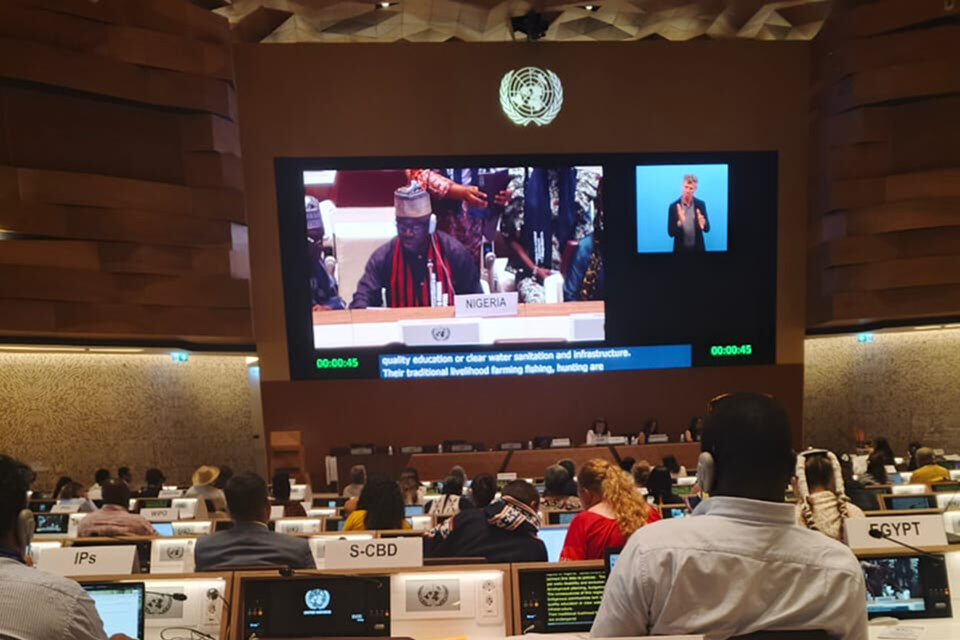Delivered by: Dr. Ibrahim M. Zikirullahi, Executive Director, CHRICED
Madam Chairperson, Distinguished Experts, Ladies and Gentlemen,
I am Dr. Ibrahim M. Zikirullahi, Executive Director of the Resource Centre for Human Rights & Civic Education (CHRICED). I am joined by six delegates—with the support of the John D. and Catherine T. MacArthur Foundation—to bring a renewed urgent global attention to the worsening plight of the indigenous peoples of Nigeria’s Federal Capital Territory (FCT), Abuja.
Today, over two million indigenous people of FCT, Abuja, otherwise known as Original Inhabitants (OIs)—representing nine tribes and seventeen chiefdoms—face systematic exclusion, land dispossession, political disenfranchisement, and cultural erasure. Without urgent and decisive action, these communities risk extinction.
The roots of their suffering trace back to Military Decree No. 6 of 1976, which forcefully appropriated their ancestral lands to establish Nigeria’s new capital. Since then, successive governments have failed to provide compensation, resettlement, or legal recognition. Not even Supreme Court judgments affirming their rights have moved the Nigerian state to honour its obligations.
In addition to the systemic marginalization faced by Abuja’s Original Inhabitants (OIs), We underscores the critical importance of data sovereignty and the right to data as a cornerstone of Indigenous Peoples’ self-determination and development.
Despite the existence of research by bodies such as UNESCO and UNICEF affirming the presence and identity of Indigenous Peoples in the FCT, the Nigerian government has failed to collect, disaggregate, and utilize this data to inform inclusive policies. This omission perpetuates invisibility and exclusion in national development planning, budgeting, and service delivery.
The consequences of this neglect are devastating:
- Abuja indigenous communities lack basic amenities—functional healthcare, quality education, clean water, sanitation, and infrastructure.
- Their traditional livelihoods—farming, fishing, hunting, and craftsmanship—are endangered by unchecked urban sprawl and ecological degradation.
- Politically, they are denied fundamental rights. The indigenous people of Abuja cannot elect a governor or state legislature, rendering them stateless in their homeland.
These injustices contravene both Nigeria’s constitutional guarantees and its obligations under international human rights law—particularly the United Nations Declaration on the Rights of Indigenous Peoples (UNDRIP), which enshrines the rights to self-determination, cultural preservation, and land ownership.
CHRICED therefore calls on this Expert Mechanism, member states, and all relevant stakeholders to hold the Nigerian government accountable and to support the following urgent actions:
- Legal Recognition: Formally recognize Abuja’s Original Inhabitants as Indigenous Peoples with full legal status and protections.
- Political Inclusion: Ensure their participation in democratic governance, including the right to elect local and regional representatives.
- Equitable Development: Enact inclusive policies that guarantee access to land, natural resources, and economic opportunities.
- Cultural Preservation: Support grassroots initiatives to safeguard indigenous languages, traditions, and sustainable practices.
- Recognition of Indigenous Data Sovereignty: Abuja’s OIs must have the right to control, access, and benefit from data concerning their communities, lands, and resources.
- Inclusive and Disaggregated Data Collection: Nigeria must collect and publish data that accurately reflects the socio-economic realities of OIs, disaggregated by tribe, gender, age, and location.
- Community-Led Data Initiatives: Support for Indigenous-led research and data systems that preserve traditional knowledge and inform culturally appropriate development.
Without accurate and inclusive data, the lived realities of Abuja’s Original Inhabitants remain obscured, and their rights continue to be denied. Data is not just a technical tool—it is a vehicle for justice, visibility, and empowerment.
Madam Chairperson, Distinguished Experts,
The survival of Abuja’s Original Inhabitants—and the preservation of their identity, dignity, and heritage—depends on urgent and coordinated intervention. Development must never come at the cost of dispossession or cultural extinction.
Let us act—now. Justice delayed is dignity denied.
Thank you.

